December3
 I’m into the home stretch for my 2012 Reading Challenges, faced with a thick stack of unread books for the month of December. If we get a couple of storm days this month, I may just make it!
I’m into the home stretch for my 2012 Reading Challenges, faced with a thick stack of unread books for the month of December. If we get a couple of storm days this month, I may just make it!
November’s entries include a couple of tomes I would never have otherwise read but for Challenges, and I’m happy for the broadening of my reading horizons. There are several prize-winners in this month’s list as well. Enjoy!
The Sisters Brothers by Patrick DeWitt (Fiction, Western, Noir)
by Patrick DeWitt (Fiction, Western, Noir) 
I had somehow expected this picaresque novel which won Canada’s Governor-General’s Award and was short-listed for the Booker prize in 2011 to be more light-hearted than it is.
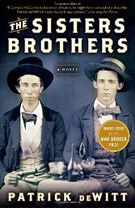 The tale is narrated by Eli Sisters who, along with his brother Charlie, have been hired by the Commodore to kill Hermann Warm, a gold miner in 1851 California. Eli, a surprisingly warm and likable outlaw, is struggling with the ethical issues in his life and is thinking about packing in the life of hired killer.
The tale is narrated by Eli Sisters who, along with his brother Charlie, have been hired by the Commodore to kill Hermann Warm, a gold miner in 1851 California. Eli, a surprisingly warm and likable outlaw, is struggling with the ethical issues in his life and is thinking about packing in the life of hired killer.
The book deserves more than this brief summary. Michael Christie writing for the National Post said “The overall effect is fresh, hilariously anti-heroic, often genuinely chilling, and relentlessly compelling (…) A mighty fine read.” I can’t say it better.
Read this if: you appreciate black comedy; you want a fresh take on a western novel; or you just want to see what all the fuss was about – it’s worth the short time it will take you to read this. 4½ stars
* * * * *
The Beggar’s Garden
by Michael Christie (Fiction, Short Stories, Canadian) 
This collection of short stories is set in the “riotous and hellish, but strangely contained, slum of [Vancouver’s] Downtown Eastside”. This area which includes part of Hastings Street is infamous across Canada. As one of Christie’s characters observes: “It was as if the country had been tipped up at one end and all the sorry b!@#$%$s had slid west, stopping only when they reached the sea, perhaps because the sea didn’t want them either.”
Told from various points of view – the grandfather who leaves food and clothing in dumpsters that he knows his drug-addicted grandson dives, an addict who has just spent his entire welfare cheque on a giant dope trip, a woman who runs a second-hand store, and so on – the stories all intrigued me. Short story collections always seem to have a few weaker pieces. I didn’t think this had any.
Read this if: you’re interested in knowing just how close any one of us is to being on the street; or you’d like some insight into the people in a Canadian city’s slum. 4 stars
* * * * *
Holes  by Louis Sachar (Fiction, Children’s Chapter)
by Louis Sachar (Fiction, Children’s Chapter) 
Holes is the winner of multiple awards including the 1999 Newbery Medal for the most distinguished contribution to American literature for children. It’s also the book upon which the movie of the same name is based. 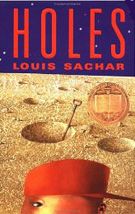
Stanley Yelnats has been unjustly sent to a boys’ detention centre (in the desert), Camp Green Lake, where the boys build character by spending all day, every day, digging holes exactly five feet wide and five feet deep. Poor Stanley: his family doesn’t have a lot of money and he thought this might be the first time he got to a summer-type camp. Instead, he ends up playing Jacob Two-Two to the Boss’ Hooded Fang.
There’s a mystery told in flashback so the reader is always ahead of Stanley, but just, and there’s piecing together for the reader to do too. It’s actually quite a bit of fun. I’m finding some really good books by reading Newbery winners.
Read this if: you saw the movie Holes (c’mon, you have to read the book); you were a fan of Jacob Two-Two ; or you like a mystery with some history, with a little good guy versus bad guy thrown in. 4 stars
; or you like a mystery with some history, with a little good guy versus bad guy thrown in. 4 stars
* * * * *
The Birth House by Ami McKay (Women’s Fiction, Canadian, Atlantic Canadian)
by Ami McKay (Women’s Fiction, Canadian, Atlantic Canadian) 
This 2007 debut novel by Canadian author Ami McKay (well, Canada claims her since she lives here now) is set in Nova Scotia on the shore of the Bay of Fundy, the bulk of the story taking place in the years 1916-1919.
The protagonist, Dora Rare, is befriended and mentored by the community’s midwife/herbalist. Over the course of her life, Dora’s home becomes the birth house – or the place where the women of the community go to have their babies, rather than making the sometimes dangerous trip into the nearest town where ‘modern’ male medicine suits their needs rather less. 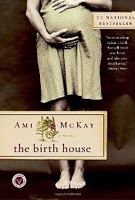
The Birth House has been described as “an unforgettable tale of the struggles women have faced to control their own bodies and keep the best parts of tradition alive in the world of modern medicine.” While I’m all for that, the rabid superstition and novena cures of the training midwife detracted from the strength of the women’s positions, in my opinion.
Read this if: women’s issues are important to you and you want to know something of their evolution in rural North America; or you want an authentic picture of WWI era Nova Scotia (the description of the aftermath of the Halifax Explosion is particularly moving). 3½ stars
* * * * *
Men at Arms by Evelyn Waugh (Literary Fiction, WWII)
by Evelyn Waugh (Literary Fiction, WWII) 
Winner of the 1952 James Tait Black Memorial Prize, Britain’s oldest literary award, Men At Arms is the first part of Waugh’s The Sword of Honour Trilogy  , his look at the Second World War.
, his look at the Second World War. 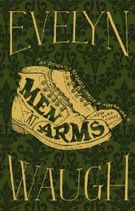 It follows Guy Crouchback, the nearly-forty-year-old son of an English aristocratic family who manages to get accepted to officers training in the early part of 1940, and is eventually posted to Dakar in Senegal West Africa. While there, he inadvertently poisons one of his fellow officers and is sent home in disgrace.
It follows Guy Crouchback, the nearly-forty-year-old son of an English aristocratic family who manages to get accepted to officers training in the early part of 1940, and is eventually posted to Dakar in Senegal West Africa. While there, he inadvertently poisons one of his fellow officers and is sent home in disgrace.
That’s about all the plot there is. But the book was interesting for its look at British officers’ instruction in WWII, in contrast with other reading I’ve done which focuses on the training of rank and file soldiers, and for the insight into the chaos that was the British Army in the early part of the war: “The brigade resumed its old duty of standing by for orders.” Waugh’s wickedly dry sense of humour is brilliant.
Read this if: you’re a fan of Downton Abbey – different war, but same country and class; or you love the subtle humour of traditional British writers. 3½ stars
– different war, but same country and class; or you love the subtle humour of traditional British writers. 3½ stars
* * * * *
Three Junes by Julia Glass (Fiction)
by Julia Glass (Fiction) 
If this hadn’t won the National Book Award in 2002, I’d tell you it was a women’s novel, and a mediocre one at that. I might still tell you that.
Three summers (1989, 1995, & 1999) in the life of a Scottish family, in Dumfries & in NYC. There are some expressive observations about death (“Everyone dies alone, no matter how many people there are in the room”); and life (“Time plays like an accordion in the way it can stretch out and compress itself in a thousand melodic ways”) but overall, I wasn’t satisfied with any of the character development, and there was little plot to speak of.
Read this if: you like cause-and-effect parent-and-children stories; or you like things tied up in a neat bundle. 3½ stars
* * * * *
Memoirs by Pierre Elliott Trudeau (Non-fiction, Memoirs, Canadian)
by Pierre Elliott Trudeau (Non-fiction, Memoirs, Canadian) 
Published in 1993, this set of former Canadian Prime Minister Trudeau’s memoirs briefly covers the first 49 years of his life including childhood, early world travels and entry into politics, and then concentrates on his time as Prime Minister from 1968-1984. 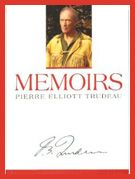
Anyone who is familiar with Trudeau’s time in office knows that humility was never his strong suit. But the man could lead – and here we gain insight into how he did that and how strong self-confidence (alright – arrogance) helped him to do it. You’ll want to have at least a basic understanding of the Canadian parliamentary system before reading this. A passing acquaintance with the political issues of the day such as Quebec’s push for sovereignty-association, and repatriation of the constitution would enrich your read but is not necessary.
Don’t expect in-depth political analysis: although this book weighs in at over two pounds when a similar sized volume might normally be a full half-pound lighter, the font is large, the text spaced, and there are a number of photographs throughout. And don’t expect any revelations about his personal life either. When in office, Trudeau scrupulously kept his family separate and apart from his political life. His memoirs’ contents mirror that.
Read this if: you loved him, or you hated him (Trudeau seemed to seldom leave anyone on the sidelines with regard to their feelings for him); you want a refresher on Canadian political history of the time (albeit from one point of view); or you want an introduction to one of Canada’s most widely-known and best-remembered leaders. 3½ stars
* * * * *
Death At The President’s Lodging (aka Seven Suspects) by Michael Innes (Fiction, Vintage Mystery)
(aka Seven Suspects) by Michael Innes (Fiction, Vintage Mystery) 
This is the first in Innes’ Inspector Appleby series and was published in 1936. I expected perhaps something akin to Agatha Christie but Innes is very different. Or perhaps I only think so because this particular mystery was set in an Oxford/Cambridge-based university and I have no understanding whatever of dons/underdons/proctors and so on and found it difficult to wade through all of those issues (which are pertinent to the crime). The mystery was solid but although I may read more Innes, given the number of untried mystery series out there, I doubt that it will be soon.
Read this if: you like a really ‘academic’ mystery, British, straight-up; or, like I did, you need an “I” author for an A-Z Reading Challenge. 3 stars
* * * * *
The Stranger by Albert Camus (Literary Fiction, Translated, WWII)
by Albert Camus (Literary Fiction, Translated, WWII) 
The preface to my edition (Everyman’s Library) states: Albert Camus’ spare, laconic masterpiece about a Frenchman who murders an Arab in Algeria is famous for having diagnosed with a clarity almost scientific, that condition of reckless alienation and spiritual exhaustion which characterizes so much of twentieth-century life. Possessing both the force of a parable and the sentence-by-sentence excitement of a perfectly executed thriller, The Stranger is the work of one of the most engaged and intellectually alert of our century’s writers.” (…)(T)he earliest readers of The Stranger recognized the bleak, claustrophobic world portrayed in Camus’ novel. The bleakness, the banality and the sense of imprisonment were interpreted as an acute and accurate evocation of the feeling of the period. [WWII Occupied France].
It’s considered a modern classic and I’m glad that I’ve read it, although reading it was not in the least enjoyable.
Read this if: you enjoy existentialist thinking (this is considered by some – although not the author – to be an example of that movement in philosophy; you want to better understand the mental attitude of the general populace of occupied France faced with the daily drudgery of earning a living, finding food and fuel and living an uneasy coexistence with the Germans; or you need a short translated piece of fiction for a Reading Challenge. 2½ stars
BOOK DEPOSITORY has free world-wide delivery:


OR: Pick up some bargains at

OR

Amazon links for Canadian readers:
The Sisters Brothers
The Beggar’s Garden
Holes
Jacob Two-Two Meets the Hooded Fang
The Birth House
Men at Arms
Sword Of Honour Trilogy
Three Junes
Trudeau’s Memoirs
Death At The President’s Lodging
The Stranger
Kindle editions:
The Sisters Brothers
Holes
The Birth House 
Men At Arms
Three Junes
Death at the President’s Lodging 
The Stranger



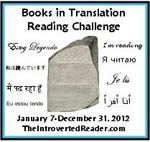 Books in Translation Challenge
Books in Translation Challenge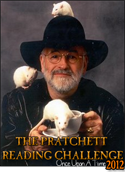 Sir Terry Pratchett Reading Challenge
Sir Terry Pratchett Reading Challenge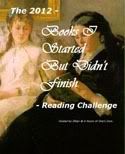 Books I Started But Didn’t Finish
Books I Started But Didn’t Finish

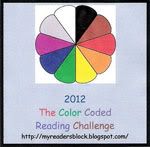 SUCCESS!
SUCCESS! The goal in the
The goal in the  To complete the
To complete the 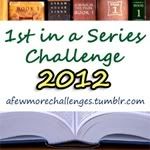
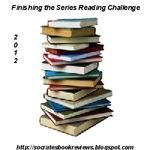

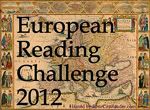
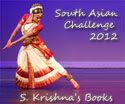
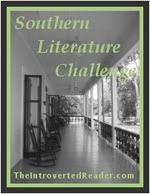 SUCCESS!
SUCCESS! 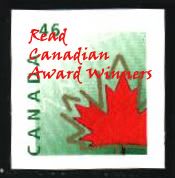 All of the books on my list but one were by new-to-me authors. The one repeat author is a favourite of mine. After a slow start, I did read all the books and greatly enjoyed them all except for the repeat author (go figure). This was my year to finally read Wayne Johnston for the first—and second—time, but not the last.
All of the books on my list but one were by new-to-me authors. The one repeat author is a favourite of mine. After a slow start, I did read all the books and greatly enjoyed them all except for the repeat author (go figure). This was my year to finally read Wayne Johnston for the first—and second—time, but not the last.

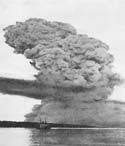 Yesterday was the 95th anniversary of the Halifax Explosion, the largest man-made explosion up to the atomic bomb. Two thousand people died, more than six thousand were wounded and blinded (by flying glass), and over 9,000 left homeless. Relief efforts were hampered by a blizzard the day after the disaster.
Yesterday was the 95th anniversary of the Halifax Explosion, the largest man-made explosion up to the atomic bomb. Two thousand people died, more than six thousand were wounded and blinded (by flying glass), and over 9,000 left homeless. Relief efforts were hampered by a blizzard the day after the disaster.  I’m into the home stretch for my 2012 Reading Challenges, faced with a thick stack of unread books for the month of December. If we get a couple of storm days this month, I may just make it!
I’m into the home stretch for my 2012 Reading Challenges, faced with a thick stack of unread books for the month of December. If we get a couple of storm days this month, I may just make it! The tale is narrated by Eli Sisters who, along with his brother Charlie, have been hired by the Commodore to kill Hermann Warm, a gold miner in 1851 California. Eli, a surprisingly warm and likable outlaw, is struggling with the ethical issues in his life and is thinking about packing in the life of hired killer.
The tale is narrated by Eli Sisters who, along with his brother Charlie, have been hired by the Commodore to kill Hermann Warm, a gold miner in 1851 California. Eli, a surprisingly warm and likable outlaw, is struggling with the ethical issues in his life and is thinking about packing in the life of hired killer.

 It follows Guy Crouchback, the nearly-forty-year-old son of an English aristocratic family who manages to get accepted to officers training in the early part of 1940, and is eventually posted to
It follows Guy Crouchback, the nearly-forty-year-old son of an English aristocratic family who manages to get accepted to officers training in the early part of 1940, and is eventually posted to 
